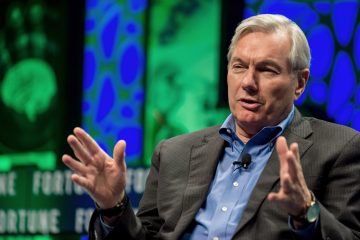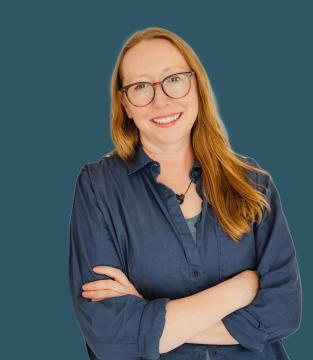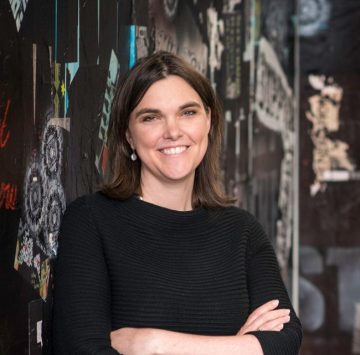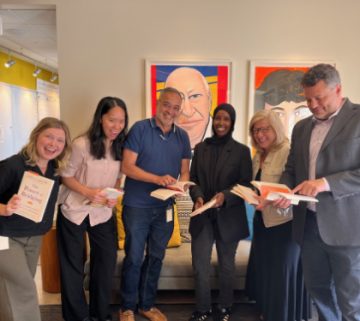Story
Pandemic Whisperer
When Michael Osterholm (BF’82) speaks about public health, the Center for Infectious Disease Research and Policy founder has the whole world listening
DATE
February 11, 2021

By Erik Tormoen
Michael Osterholm shoulders something he calls “the pain of dying.” In his 45-plus years in epidemiology, the infectious-disease expert has attended to many people in their final moments while facing off against scores of grisly afflictions around the world. Some have left indelible marks on his soul, like the time he stood at the bedside of a teen girl as she died from toxic shock syndrome. Her body had retained so much fluid that she was nearly unrecognizable. Her mother wanted — more than anything, he says — to show him a picture of how she looked before.
Osterholm tells this story over Zoom in late 2020 from his home office, shortly after he was announced as an appointee to what is now President Biden’s COVID-19 Advisory Board.
Today, he tells me he’s also experiencing “the pain of living.” “I watch these healthcare workers — and it’s hard. They are heroes, beyond anything I can explain in words.” He begins to choke up. “I see what this pandemic’s doing, and it’s so cruel. It’s cruel in who it’s infecting — the racial disparities — it’s cruel in terms of the pain that it’s caused people for political reasons and how it has split families apart.”
On TV, Osterholm does not get so personal. Whether he’s talking to Minnesota TV stations, CNN or Fox, he delivers scientific findings without sugarcoating — seeming, to some, like a doomsayer. And yet, at the same time, he embraces his down-home Midwestern-ness. The gentle-voiced 68-year-old, capped with a swoop of white hair, often uses folksy expressions and baseball metaphors. He has compared the futility of contact tracing, amid escalating cases, to the absurdity of planting petunias in a Category 5 hurricane. His style is inspired by how he’d talk to the coffee group at the S&D Cafe in Waukon, Iowa — his hometown.
Between appearances, Osterholm stays busy absorbing as much information as he can. A self-described disease detective, he keeps a “crazy file cabinet” in his head full of ongoing concerns beyond COVID-19: antimicrobial resistance, chronic wasting disease, Ebola, Zika. How does he retain all that, plus pandemic stats? “I actually like to work; I like to read,” he says. “It’s natural.”
What Osterholm brushes off as natural comes from decades of study and experience. In 2001, he founded the Center for Infectious Disease Research and Policy (CIDRAP). The hub, based at the University of Minnesota, translates scientific data into real-world solutions, whether that’s in vaccine development, air-quality monitoring or public education.
Since at least 2005, Osterholm has been telling us a pandemic was imminent. In his 2017 New York Times best-selling book “The Deadliest Enemy,” he went so far as to lay out a nine-point battle plan for handling influenza pandemics and other microbial threats, since he saw no international governance structure that was adequately prepared to respond.
As soon as COVID-19 emerged, he was vocal about it. On the day in January 2020 that 14 cases cropped up among Wuhan healthcare workers, he sent an email to colleagues stating his certainty that this novel coronavirus would cause our next pandemic. After his email, he recalls, “I received so many negative emails and calls from people I know, who said, ‘This is really scary; why are you doing this?’”
Since then, he has consistently promoted social distancing, while warning us that masks may not offer perfect protection from the virus. Prior to COVID-19, Osterholm says he never received death threats, and now he expects them every week. Ironically, he worries that his work — which is all about saving as many people as possible — could endanger his family. “However legitimate [the death threats] are, they’re very challenging,” he says.
If he accepts his reputation as “Bad News Mike,” he still abides by an absolute requirement to pick every word with care. “In this world, there’s no throwaway lines,” he says. “Every line is connected to something or somebody.”
Growing up in rural Iowa, the oldest of five kids, Osterholm learned fast how to lead and care for others. He became the de facto guardian of his family under the physically abusive sway of his alcoholic father. His mentor, a family friend called Nana, introduced him to medical journalism in The New Yorker magazine, sparking his interest in public health. She also told him that the most important thing to do is “to leave a forever living legacy,” big or small.
From the mid-’70s through the ’90s, he worked at the Minnesota Department of Health (MDH), after studying biology and political science at Luther College and environmental health at the University of Minnesota. At MDH, he analyzed foodborne diseases, investigated hepatitis B and HIV in healthcare settings and linked toxic shock syndrome to tampons. As Minnesota’s state epidemiologist for 15 years, he was also one of the first to tackle HIV in the early ’80s.
In 1982, Osterholm won a Bush Fellowship. Through the Fellowship, he attended the Salzburg Global Seminar on HIV/AIDS and met people who later emerged as key players amid the epidemic — as well as lifelong friends. “That was my first real international experience,” Osterholm says. “I never turned back. I always saw the world, from that moment on. Even though I was in Minnesota, it was all about the globe, not just one state.”
Years later, Osterholm realized that, to fulfill his global calling, he would have to leave his post as Minnesota’s state epidemiologist. Just as a meningitis outbreak began unfolding in Duluth, the king of Jordan urgently called, requesting an in-person consultation. Osterholm hopped on a plane that night. “I’ll never forget being on that flight, feeling horrible that I was leaving behind my team,” he says. But by that point, the state’s infectious disease department had grown from a handful of people, when he started in the ’70s, to more than 75 on staff. “I said, ‘I’ve got to move on. It’s time to turn it over.’” He left MDH in 1999. Several department colleagues joined him to launch CIDRAP as a research and advisory organization focusing on global public health.
Although he’s CIDRAP’s director, Osterholm shies from the word “leader.” “I think I have seen myself as a coach,” he offers. “I have been fortunate to surround myself with really, really incredible people.” Some of those people he’s known for more than three decades.
What guidance would he give to other leaders? He leans in, able to secure an interpersonal connection even over Zoom: “Cultivate your heart as much as you do your head.” How? “Don’t try to make someone be something they’re not. Help them be who they are and what they are, rejoice in that and appreciate.”
Looking to the future, Osterholm can’t imagine retiring — “I’m just as much in the throes of my career now as I’ve ever been.” But he’d like to spend more time fly-fishing in New Zealand, and hanging out with his kids and five grandkids, and visiting his family’s cabin on the Gunflint Trail.
He recently started the Frontline Families Fund for healthcare workers, which has raised more than $1.75 million so far. Also, he’s writing another book. “This time, it talks about, ‘What did we learn with this [pandemic]?’ And what do we need to be prepared for with the next big one?”
“Because there will be a next big one, absolutely,” he adds. “It’s kind of like a surgical residency: you see one, you do one, you teach one. Bam, bam, bam. Here we are, in this pandemic. We do one and we learn from it. And now we’ve got to teach about it.”
As an associate editor for Minnesota Monthly, Erik Tormoen writes and edits stories, helps oversee the magazine’s presence on digital and social media platforms, and contributes articles to Greenspring Media’s custom publications.
Continue reading
-

News
Welcome to new Bush staff members
We are celebrating some new Bush colleagues and hope you get to meet them soon!
-

Note from Jen
Protecting our freedom to give
Do you know how CPR came to be? What about the 911 system? Ever wonder who developed the Pap smear? Or why school buses are all the same color? All these were the results of work funded by some foundation.
-

News
Introducing the Bush book club
Join us as we learn how to build a world where we all belong. And stay tuned as we get ready to welcome john a. powell to Minnesota for a special Bush book club event!